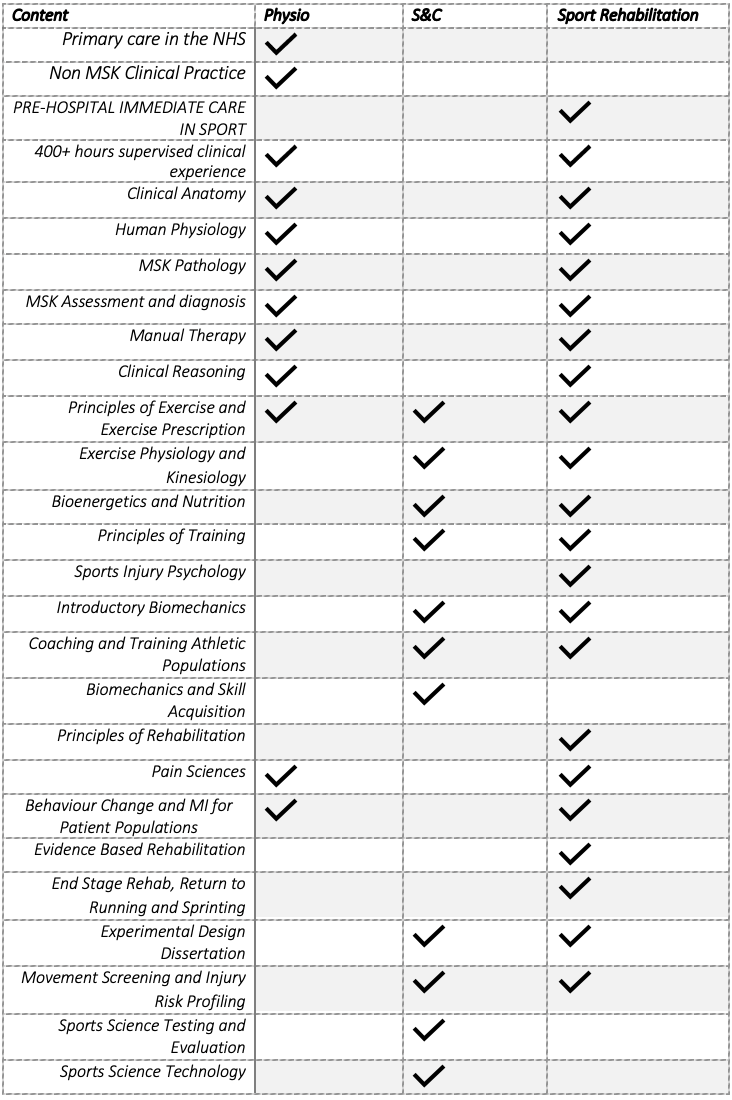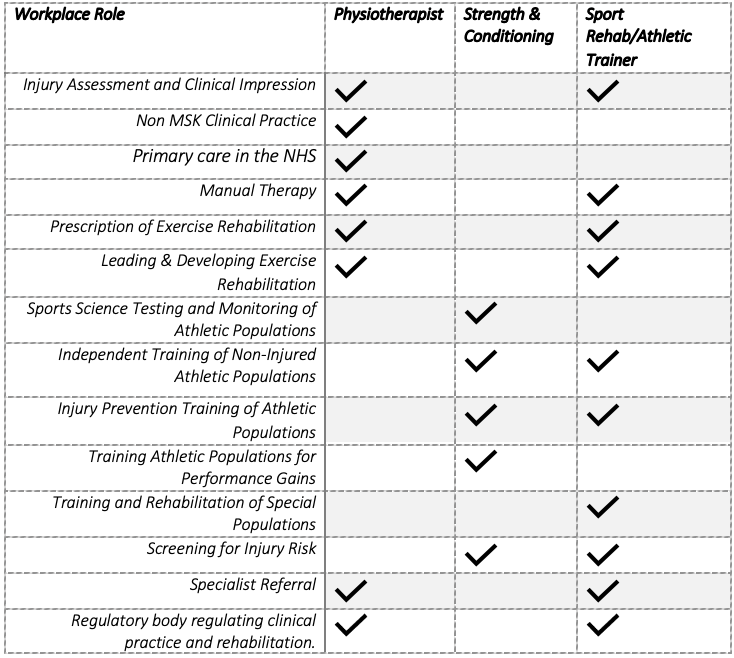A recent blog post S&C or Physio – who are the real exercise professionals? written by physiotherapist Mr Uzo Ehiogu identified the need for ‘the physiotherapist wanting to use exercise as a primary mode of intervention’ to up-skill and sharpen their skill set in this area. This stance from a Specialist Musculoskeletal Physiotherapist should be applauded, as identifying and embracing the development areas for the MSK sector is necessary to drive improvement, it’s a brave and commendable stance to take.
Mr. Ehiogu described short, weekend courses as ‘an insult to S&C professionals’ and concluded ‘Rehabilitation of athletes (recreational and professional) must be recognised as an advanced practice skill requiring specialist training’. While short courses may be a starting point, formal education will undoubtedly provide the most comprehensive opportunity to up-skill, given the extent of exercise science as a topic. If developing knowledge of strength and conditioning & exercise science is the goal, wouldn’t it be ideal for physiotherapists to study these areas in the context of working with patients with injuries & co-morbidities, as opposed to looking purely through a performance lens?
Physiotherapists without appropriate post-graduate training are appropriately regulated healthcare professionals without the skills required for rehabilitation of injured athletes. S&C professionals are highly trained and skilled exercise professionals without the training, competencies, or regulation to work with patient populations.
This is supported within the literature based on a recent multinational survey that although up to 89% of their roles involved exercise prescription, physiotherapy respondents only stated the appropriate interventions for aerobic training and strength training, 60% and 53% of the time respectively (Barton et al. 2021). This contrasts with findings from a narrative review by Maestroni et al. (2020) where all healthcare professionals working within exercise rehabilitation should be able to utilise strength-based interventions from an evidence-based approach accurately.
This is where the discipline of Sport Rehabilitation comes into its own. A choice to study Sport Rehabilitation is a choice to learn to integrate exercise science and advanced exercise prescription within the context of a comprehensive, patient-centred rehabilitation program.
The Scope of Sport Rehabilitation
Mr. Ehiogu is not the first to identify this need for exercise-rehabilitation training at the higher education level. 25 years ago, Julian Hatcher was brave enough to identify the shortcomings of his own physiotherapy training in preparing him for his role with Great Britain rugby league.
The end result was the foundation of the British Association of Sport Rehabilitators (BASRaT), Sport Rehabilitation degree programmes and Sport Rehabilitation as a profession.
Sport Rehabilitation was envisaged as a hybrid of clinical practice and exercise science and today graduates work across a range of roles within the NHS, Elite Sport, Private Clinical Practice and the Ministry of Defence.
The following chart offers a comparative breakdown of typical undergraduate training in the UK:

The next chart shows the scope of Practice for the 3 Professions (NHS/CSP, NSCA/ASCA*, BASRaT)
*Scope of practice for S&C coaches in the UK was not readily available.

As the above charts demonstrate, the question already has an appropriate answer. Post-graduate qualifications for skill development are the accepted norm, where dual registered Physiotherapists /Sport Rehabilitators and S&C professionals/Sport Rehabilitators can provide broader skill sets and more specialist expertise to the end-user. Physiotherapists wishing to work further along the rehabilitation spectrum, delivering more advanced exercise prescription, return to play and preventative conditioning programmes, can access BASRaT accredited MSc programmes to provide the relevant skills. The exercise content is delivered from a clinically integrated perspective that is not part of an S&C post-graduate training programme and utilises both clinical assessment and a diagnostic foundation with a patient centred focus.
Similarly, if a strength and conditioning professional wishes to specialise in exercise-based rehabilitation, working with injured populations without direct supervision from a healthcare professional, then BASRaT accredited qualifications and subsequent registration facilitates that specialism for them. Without it they are in fact working outside their scope of practice and leave themselves open to litigation from clinical populations.
Today, patients are the centre of everything that BASRaT does. They hold a graduate register accredited by the Professional Standards Authority in Health and Social Care (PSA) with standards commensurate with the more traditional healthcare occupations. They also work in national collaborative groups to improve patient care and rehabilitation, including alongside organisations like the Chartered Society of Physiotherapists in the Community Rehabilitation Alliance, the Arthritis and Musculoskeletal Alliance (ARMA) and Macmillan Cancer Support and the Royal College of Anaesthetists working on exercise rehabilitation projects. For many years, BASRaT registrants have also been working in specific roles for the Ministry of Defence as Exercise Rehabilitation Instructors. Utilising their exercise rehabilitation expertise, they are also working with Health Education England contributing to the development of advanced practitioner standards for the traditional healthcare professions.
The international profession of Athletic Training and Therapy plays a key role in optimizing care, injury prevention, rehabilitation, and supporting the rights of patients and the public to achieve their potential to live well. To support this on a global scale, partnerships are necessary to enhance both patient and population health. As a result, the Athletic Training and Therapy professional and credentialing organisations of ARTI (Ireland), BASRaT (Britain), BOC (USA), and CATA (Canada) have developed an International Arrangement to ensure comparable best practices, quality education, professional standards, and the opportunity for professionals to be mobile on a global level by creating a pathway to challenge each other’s credentialling examination. BASRaT and the International Partners are working with International Consultants of Delaware, Inc.*, a division of CGFNS International, Inc. to develop a comparability tool tailored to each organisation. CGFNS has been the world’s largest credentials evaluation organisation for the nursing and allied health professions since 1977.
As the need for clinically informed, clinically competent exercise professionals becomes more recognised and grows, professionals working within the wider MSK sector must come together to recognise rehabilitation as an advanced practice skill requiring specialist training and professional regulation. We welcome this conversation, as only by working together will we improve rehabilitation for the those at the centre of everything that matters to us as exercise and rehabilitation professionals; our patients and athletes.
Sport rehabilitation programmes are available in the UK at BSc and MSc levels at multiple institutions with graduates working across the NHS, the Ministry of Defence and sport at the highest levels, including Liverpool FC, Manchester City FC, British Cycling and GB Basketball.
Authors and Affiliations:
Michael Carolan MSc BSc (Hons) BASRaT-reg CSCS
Teaching and Learning Fellow in Sport Rehabilitation, University of Salford,
Strength & Conditioning Coach / Sport Rehab for GB and England Basketball Age Group Teams, Performance Lead for Andrew Robertson GB 60m Indoor Champion.
Evie Prescott MSc BSc (Hons)
Teaching and Learning Fellow in Sport Rehabilitation, University of Salford. Academy Sport Rehabilitator at Wigan Athletic FC.
Christopher Peil MSc BASRaT-reg GSR CSCS ACSM EP-C
Teaching and Learning Fellow Sport Rehabilitation, University of Salford. Strength and Conditioning Tutor, Wigan Warriors.
Steve Aspinall MSc BSc (Hons) BASRaT-reg GSR FHEA
Chief Executive, British Association of Sport Rehabilitators and Trainers.
Lecturer in Sport Rehabilitation, University of Salford.
References:
Barton, C. J., King, M. G., Dascombe, B., Taylor, N. F., de Oliveira Silva, D., Holden, S., … & Shields, N. (2021). Many physiotherapists lack preparedness to prescribe physical activity and exercise to people with musculoskeletal pain: A multi-national survey. Physical Therapy in Sport, 49, 98-105.
Maestroni, L., Read, P., Bishop, C., Papadopoulos, K., Suchomel, T. J., Comfort, P., & Turner, A. (2020). The benefits of strength training on musculoskeletal system health: practical applications for interdisciplinary care. Sports Medicine, 1-20.
https://www.csp.org.uk/system/files/musculoskeletal_framework2.pdf
https://www.strengthandconditioning.org/documents/asca-scope-of-practice.pdf